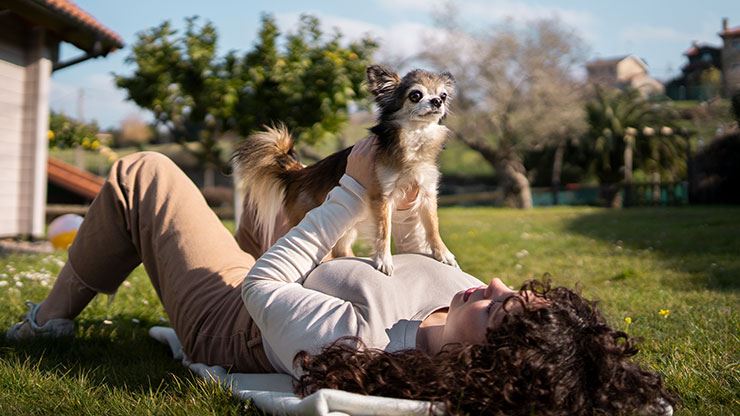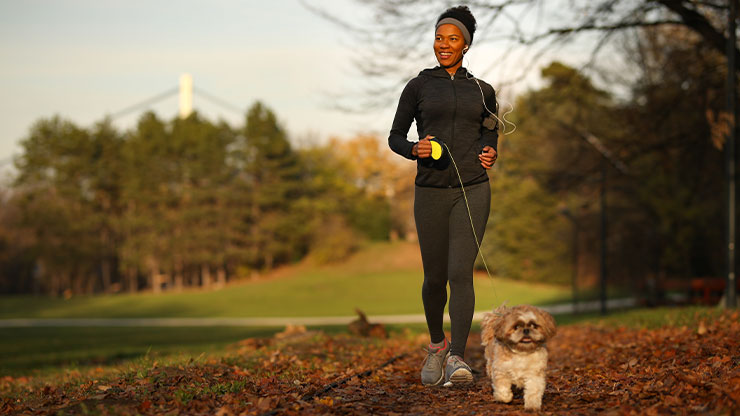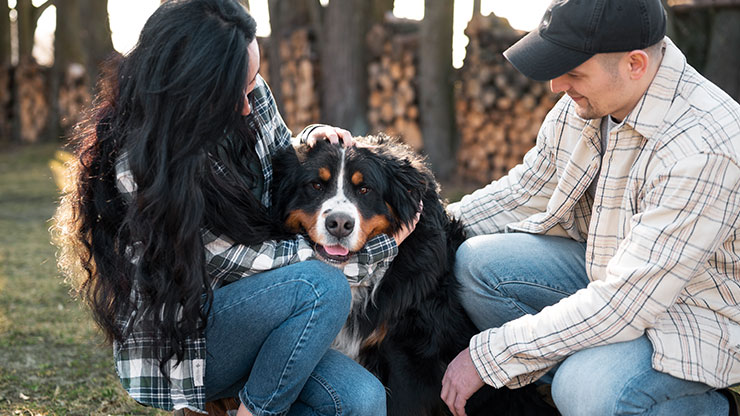
5 Ways Dogs Help Their Owners Overcome Depression and Social Anxiety
“An estimated 26% of Americans ages 18 and older — about 1 in 4 adults — suffer from a diagnosable mental disorder in a given year,” according to John Hopkins Medicine. Depression, in particular, affects 280 million people, while 7.1% of the U.S. population lives with social anxiety. And don’t forget about the people navigating depression and social anxiety. Both can be debilitating mental health conditions that negatively affect the way one thinks, feels, behaves, and lives. Fortunately, the conversation around mental health support is ramping up. Medications, therapy, and self-care are commonly offered as the best ways to soothe many mental health conditions. Creative solutions are mentioned as well, like getting a dog. Dogs can help their owners overcome depression and social anxiety. Here’s how.
Encouraging Socialization at a Comfortable Pace
Loss of interest in activities and isolation are two common symptoms of depression. Social anxiety can make you so fearful of interacting with strangers and being judged that you stop going out altogether. However, socialization can actually help you with depression. Positive interactions with people can lift your mood and make you feel less alone. Slowly socializing also helps you move through the fears that come with social anxiety. Resisting the urge to isolate and engaging in focused social interactions are key to overcoming social anxiety. Your depression can benefit from them too. Lean on your dog to help you with both. For example, whenever you feel like hiding in your room, you can take your dog out for a walk around the neighborhood or throw them in the car to run a few errands you’ve been pushing back. You can also take them to the dog park. Short chats with other owners are a way to engage in focused social interactions.

Promoting Physical Activity
According to a scholarly article published in the National Library of Medicine, “Exercise improves mental health by reducing anxiety, depression, and negative mood and by improving self-esteem and cognitive function. Exercise has also been found to alleviate symptoms such as low self-esteem and social withdrawal.” After reading research like this, we can conclude that there is an undeniable link between exercising regularly and improved mental health. Dogs can help owners living with depression and social anxiety get the physical activity they need to keep their symptoms in check.
For example, it’s critical for seniors to stay active, especially when they're navigating a mental health challenge. Staying active can result in community participation, healthy relationships, socializing, and better cognitive function and physical health. Group travel and outdoor clubs are some of the best ways for seniors to stay active. They’re also perfect for bringing your dog along. There are traveling groups that cater to dog owners and offer pet-friendly trips. Hiking, camping, and walking clubs are in abundance, and dogs are almost always welcome. Even something as small as taking your dog on its daily walk can give you the exercise you need to stave off depression and social anxiety symptoms.
Providing Companionship
We’ve all heard the saying, “A dog is a man’s best friend.” You can have such a meaningful bond with your dog that it’s deemed one of the best friendships you have in your life. Dogs offer great companionship to people of all ages living with depression and anxiety. They can offer comfort, affection, and kindness. Their cuddles can be so calming and relaxing that anxiety and depression symptoms wash away. In addition, playing games with them provides a level of social interaction and engagement that’s comfortable for those living with anxiety and depression disorders. Ultimately, a dog’s companionship is genuine. They accept and love you for you. Sometimes, knowing they have someone genuine by their side who inspires happiness is all someone living with depression or social anxiety needs.
A Source of Safety and Protection
Living with depression or social anxiety can be scary. Thoughts can become so dark that you don’t want to think. Loneliness can get incredibly overwhelming. Your symptoms can wage an attack on you anywhere. And you start to lose trust in yourself and hope that things will improve. A huge part of being able to navigate social anxiety and depression successfully is having someone or something that makes you feel safe and protected, like your dog. They can help owners stay calm in social settings. They can protect you if an anxiety attack or depressive episode happens when you’re out. They can help you feel safe when you feel like your symptoms are too much for you to handle. Dogs are a great source of safety and protection for their owners living with depression or social anxiety.

Keeping You on Your Toes
One of the worst parts about living with depression or social anxiety is that both conditions can make you feel like you don’t want to do anything. For instance, you’re so uncomfortable with interacting with new people that you find ways to do everything without leaving your house. Or, depression sucks so much energy and life out of you that you put off any and everything. This often leads to a sedentary lifestyle where your brain and body don’t get the activity they need to function at their best. Having a dog keeps you on your toes. You have to get up and walk them and feed them every day. You have to play with and interact with them to keep them stimulated and growing. You’ve got to take them to the vet and get them around other dogs. A dog forces you to live life. And that, in turn, forces you to face depression and anxiety head-on.
Conclusion
Overcoming depression and social anxiety is possible with the right support. Lean on your dog for that support. They can offer companionship and protection, as well as encourage the socialization, exercise, and activity you need to thrive through these tough mental health conditions.










